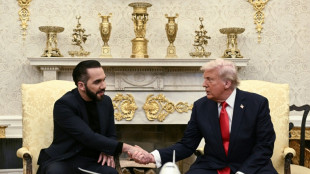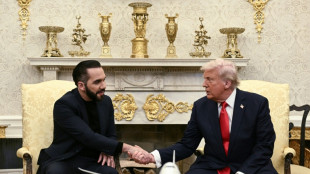
-
 El Salvador offers to swap US deportees with Venezuela
El Salvador offers to swap US deportees with Venezuela
-
Higgo holds on for win after Dahmen's late collapse

-
 El Salvador's president proposes prisoner exchange with Venezuela
El Salvador's president proposes prisoner exchange with Venezuela
-
Gilgeous-Alexander, Jokic, Antetokounmpo named NBA MVP finalists

-
 Thomas ends long wait with playoff win over Novak
Thomas ends long wait with playoff win over Novak
-
Thunder rumble to record win over Grizzlies, Celtics top Magic in NBA playoff openers

-
 Linesman hit by projectile as Saint-Etienne edge toward safety
Linesman hit by projectile as Saint-Etienne edge toward safety
-
Mallia guides Toulouse to Top 14 win over Stade Francais

-
 Israel cancels visas for French lawmakers
Israel cancels visas for French lawmakers
-
Russia and Ukraine trade blame over Easter truce, as Trump predicts 'deal'

-
 Valverde stunner saves Real Madrid title hopes against Bilbao
Valverde stunner saves Real Madrid title hopes against Bilbao
-
Ligue 1 derby interrupted after assistant referee hit by projectile

-
 Leclerc bags Ferrari first podium of the year
Leclerc bags Ferrari first podium of the year
-
Afro-Brazilian carnival celebrates cultural kinship in Lagos

-
 Ligue 1 derby halted after assistant referee hit by projectile
Ligue 1 derby halted after assistant referee hit by projectile
-
Thunder rumble with record win over Memphis in playoff opener

-
 Leverkusen held at Pauli to put Bayern on cusp of title
Leverkusen held at Pauli to put Bayern on cusp of title
-
Israel says Gaza medics' killing a 'mistake,' to dismiss commander

-
 Piastri power rules in Saudi as Max pays the penalty
Piastri power rules in Saudi as Max pays the penalty
-
Leaders Inter level with Napoli after falling to late Orsolini stunner at Bologna

-
 David rediscovers teeth as Chevalier loses some in nervy Lille win
David rediscovers teeth as Chevalier loses some in nervy Lille win
-
Piastri wins Saudi Arabian Grand Prix, Verstappen second

-
 Kohli, Rohit star as Bengaluru and Mumbai win in IPL
Kohli, Rohit star as Bengaluru and Mumbai win in IPL
-
Guirassy helps Dortmund past Gladbach, putting top-four in sight

-
 Alexander-Arnold lauds 'special' Liverpool moments
Alexander-Arnold lauds 'special' Liverpool moments
-
Pina strikes twice as Barca rout Chelsea in Champions League semi

-
 Rohit, Suryakumar on song as Mumbai hammer Chennai in IPL
Rohit, Suryakumar on song as Mumbai hammer Chennai in IPL
-
Dortmund beat Gladbach to keep top-four hopes alive

-
 Leicester relegated from the Premier League as Liverpool close in on title
Leicester relegated from the Premier League as Liverpool close in on title
-
Alexander-Arnold fires Liverpool to brink of title, Leicester relegated

-
 Maresca leaves celebrations to players after Chelsea sink Fulham
Maresca leaves celebrations to players after Chelsea sink Fulham
-
Trump eyes gutting US diplomacy in Africa, cutting soft power: draft plan

-
 Turkey bans elective C-sections at private medical centres
Turkey bans elective C-sections at private medical centres
-
Lebanon army says 3 troops killed in munitions blast in south

-
 N.America moviegoers embrace 'Sinners' on Easter weekend
N.America moviegoers embrace 'Sinners' on Easter weekend
-
Man Utd 'lack a lot' admits Amorim after Wolves loss

-
 Arteta hopes Arsenal star Saka will be fit to face PSG
Arteta hopes Arsenal star Saka will be fit to face PSG
-
Ukrainian troops celebrate Easter as blasts punctuate Putin's truce

-
 Rune defeats Alcaraz to win Barcelona Open
Rune defeats Alcaraz to win Barcelona Open
-
Outsider Skjelmose in Amstel Gold heist ahead of Pogacar and Evenepoel

-
 Arsenal make Liverpool wait for title party, Chelsea beat Fulham
Arsenal make Liverpool wait for title party, Chelsea beat Fulham
-
Trump slams 'weak' judges as deportation row intensifies

-
 Arsenal stroll makes Liverpool wait for title as Ipswich face relegation
Arsenal stroll makes Liverpool wait for title as Ipswich face relegation
-
Sabalenka to face Ostapenko in Stuttgart final

-
 Kohli, Padikkal guide Bengaluru to revenge win over Punjab
Kohli, Padikkal guide Bengaluru to revenge win over Punjab
-
US aid cuts strain response to health crises worldwide: WHO

-
 Birthday boy Zverev roars back to form with Munich win
Birthday boy Zverev roars back to form with Munich win
-
Ostapenko eases past Alexandrova into Stuttgart final

-
 Zimbabwe on top in first Test after Bangladesh out for 191
Zimbabwe on top in first Test after Bangladesh out for 191
-
De Bruyne 'surprised' over Man City exit


Friends at first sniff: People drawn to others who smell like them
It's often said that people who click right away share "chemistry."
This expression could be true in the literal sense, according to a new study published in the journal Science Advances on Friday, which finds people with similar body odors are more likely to hit it off as friends.
"Nonhuman terrestrial mammals constantly sniff themselves and each other and, based on this, decide who is friend or foe," wrote a group of researchers led by Inbal Ravreby at Weizmann Institute of Science in Israel.
Since people seek friends who are similar to themselves, the team hypothesized that humans may smell themselves and others to subconsciously estimate body odor similarity and judge their compatibility.
To find out, they set about collecting samples from pairs of same-sex, non-romantic friends who described themselves as having clicked at first sight, that is to say "where a sense of friendship was formed before extensive biographical information was exchanged," according to the paper.
After an extensive recruitment effort, they found 20 pairs, half of whom were male, and the other half female, all aged between 22 and 39 years old.
In order to prevent contamination or outside factors influencing their samples, all participants had to follow a strict protocol that included avoiding pungent foods and sleeping away from their partner and pets in a clean cotton T-shirt that was provided to them.
The T-shirts were collected in ziplock bags and tested with an electronic nose -- a device equipped with sensors to analyze chemical composition. The researchers found that the odor signatures of "click friends" were statistically more closely matched than odors between non-friends.
To assess whether the eNose results accurately mirrored human perception, the team recruited human smellers and devised a set of tests to check the validity of their result.
In one of these tests, for example, the human smellers were presented with three odors: two from a pair of click friends, and one outlier. They successfully identified the pairs and rejected the outlier.
- Smell predicted friendships too -
These results seemed to confirm the hypothesis that similar smells might spur friendship, but an alternative explanation was that people who are friends spend a lot of time together and so have similar body-odor shaping experiences, such as where they live and what they eat.
To disentangle these two possibilities, the team devised another test to see whether smell could be a successful predictor in whether two people who've never met go on to click.
They recruited 17 strangers and had them all interact with one another in a test called the "Mirror Game" -- standing half a meter apart so they could subconsciously smell each other, they were asked to mimic each other's hand movements for two minutes, without talking to each other.
Chemical similarity in their odors, as tested by the eNose, successfully predicted mutual clicks in 77 percent of cases, and predicted 68 percent of cases where both sides said they did not click.
What's more, the closer people's smell was, the more they reported liking each other, understanding one another, and feeling greater chemistry between themselves.
Together, the study's results "converged to suggest that human same-sex nonromantic click friends smell more similar to each other than expected by chance," the team concluded.
Humans, unlike other terrestrial mammals, use complex language to interact, and so it's possible the effects of smell in lab settings were amplified compared to how important they may have been in real life, the team wrote.
"Nevertheless, we think our results imply that we may also be more like other terrestrial mammals in this respect than we typically appreciate."
L.Dubois--BTB



